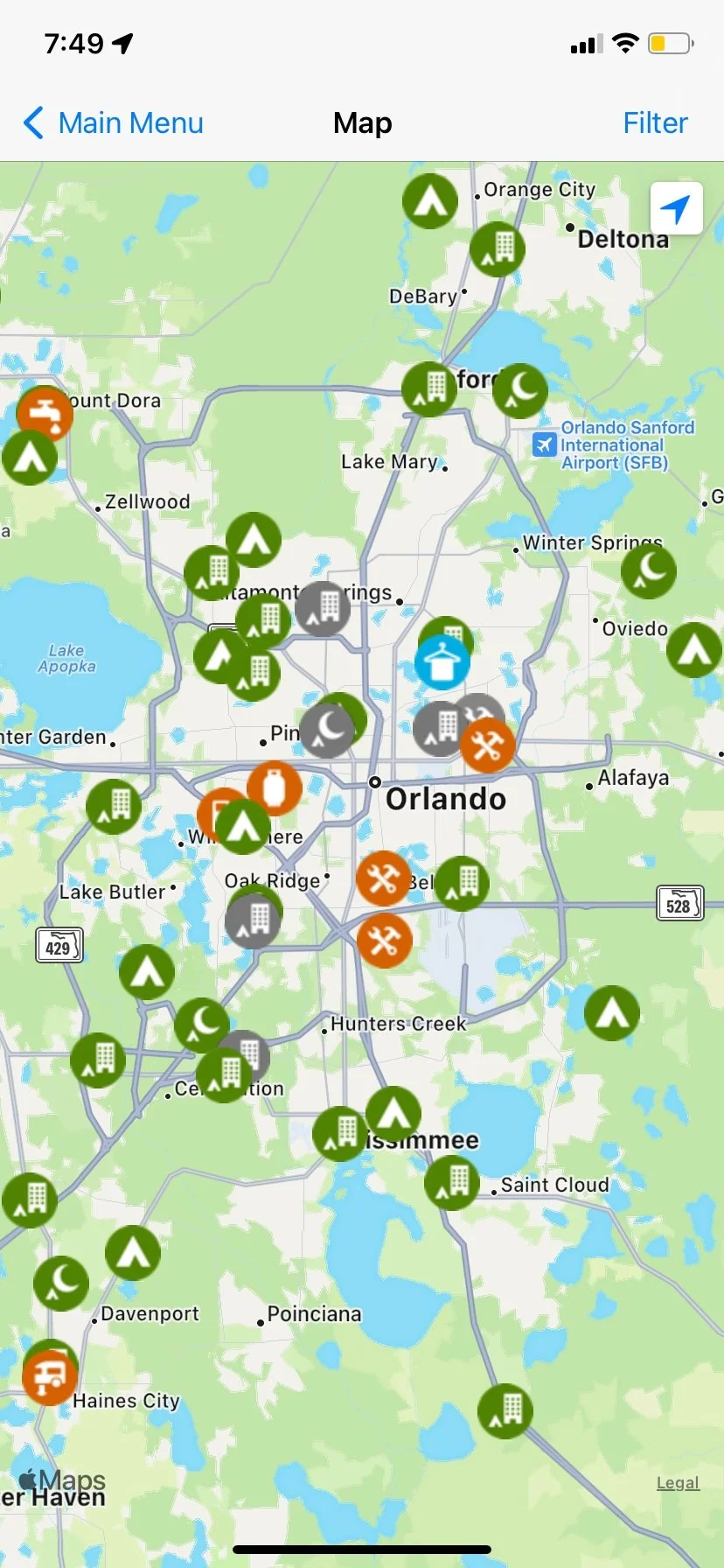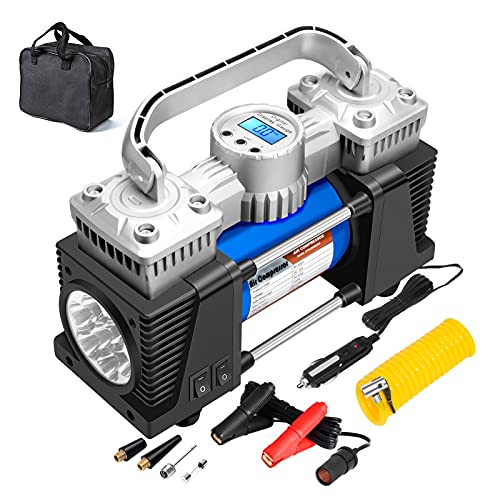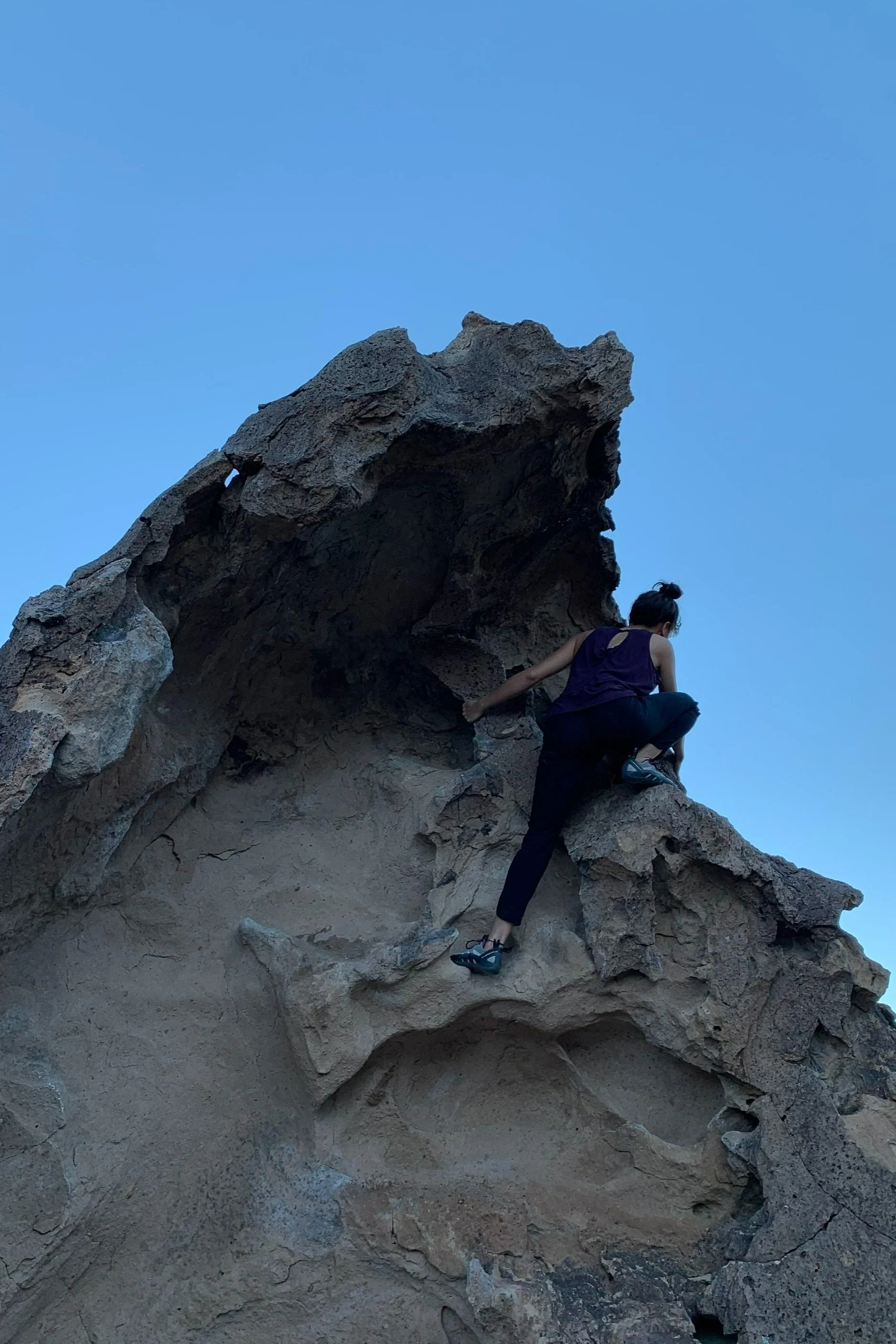Vanlife is Hard
There is a misconception due to social media that vanlife is a perfect lifestyle, but that couldn’t be farther from the truth. Vanlife is incredibly rewarding but comes with a slew of mental, physical, and financial challenges. Hopefully, by the time you finish reading about the lifestyle, you’ll have a better idea if vanlife is right for you.
Essential Applications
iOverlander
We use this app every single day for so many different things! iOverlander is a free, user-submitted database of places for nomads. Listings include campgrounds, wild/urban campsites, mechanics, water sources, laundromats, showers, and so much more. I cannot recommend this app enough if you are considering vanlife.
GasBuddy
GasBuddy shows you real-time prices so you can find the cheapest gas in town. This app is especially helpful if you own an older van like ours that doesn’t get the best MPG. Not only will you notice a difference at the pump, but you’ll also save tons over time.
Planet Fitness
The most popular gym/shower solution for nomads is the PF Black Card, which gives you unlimited access to over 2,000 gyms nationwide for around $20 a month. The Planet Fitness app allows you to seamlessly check in a guest so you don’t have to enter their information every time.
Sekr
Sekr, formerly The Vanlife App, is an excellent resource for finding community, events, and resources. The app displays how many people are nearby and their general location, allowing you to meet like-minded travelers. It operates somewhat like social media, as you can request to connect with other people and chat.
Facebook
Facebook groups are an excellent way to meet fellow vanlifers. We joined as many as we could when we first started and have chatted with lots of people. Facebook is also a great resource for buying and selling converted campervans.
An example of all the different locations iOverlander has to offer.
Essential Gadgets
Air compressor
A portable air compressor is required if you want to repair a flat tire on the road. Ours connects directly to the battery or through the 12V car outlet and inflates a tire in about five minutes.
Tire repair kit
A tire repair kit won’t fix larger problems like blowouts or defects, but it can fix most puncture-related flats. Simply remove the sharp object in question, widen the hole using the specialized tool, insert a rubber string, and trim the length accordingly.
Tire pressure gauge
Driving at the right PSI is vital for the proper operation and lifetime of your tires. The easiest way to maintain the right pressure is with a tire pressure gauge.
Bluetooth aux
In lots of older vans, there is no place for an aux cord nor any Bluetooth connectivity to play your music. A workaround is to purchase a Bluetooth FM transmitter to play music over a radio station of your choosing.
Water filter
We mostly fill up our water supply using hose water, so having some way to filter out contaminants or microbes is incredibly helpful. This filter allows you to pour clean water instantly without having to wait for it to filter.
First aid kit
A first aid kit is something you don't think about until you need it. We’ve gotten a couple of minor scrapes/cuts on the road and are always thankful to have bandages nearby.
Portable battery
Depending on your electricity setup, it might be wise to have a portable battery. We charge ours while we work in coffee shops and can power small devices for days.
Inflatable stand-up paddleboard (SUP)
An inflatable SUP is an excellent choice for water sports as they’re portable, versatile, and lightweight (relatively). You can lounge around, test your balance, paddle strenuously, explore inaccessible areas, go surfing in easy waves, bring a companion (pet or human), and so much more.
Climbing pad
A climbing pad, especially a used one, is an excellent investment as there are rocks to climb worldwide. Even if you don’t have a pad, the social nature of the sport enables you to quickly meet up with someone who does.
Jetpack (MiFi device)
If you plan to work on the road and need a reliable hotspot for all your devices, consider getting a MiFi device (we use Jetpack through Verizon). Each carrier is different, however, so make sure to research the most economical choice.
Headlamps
Unless you have impeccable lighting throughout and around your entire vehicle, a decent headlamp will surely make your life easier. We’ve found there are lighting dead zones under furniture, outside, and in our kitchen storage.
Garmin inReach
If you plan on driving through rural areas or spending time in extremely remote places, it's important to be able to contact emergency services and family. The Garmin inReach helped us keep in touch while driving through Alaska and Canada.
Climbing helps us meet people all over the country as it’s such a social sport.
Lug wrench and car jack
The kit preinstalled in your vehicle should suffice, although we bought an x-shaped lug wrench to help with removing our lug nuts—sometimes they get over-tightened and become extremely difficult to remove.
Trash can
A small kitchen trash can with a locking lid is perfect for keeping out pesky odors. Gas stations, grocery stores, rest stops, and fast-food restaurants are excellent places to dispose of trash.
Vacuum
A mini, rechargeable vacuum is perfect for vanlife. While it doesn’t take much for a vehicle to get dirty, it also doesn’t take much to keep such a small space clean.
Electric cooler
Depending on your budget, an electric cooler can greatly improve your quality of life. Dometic makes several sizes of energy-efficient coolers designed with mobile living in mind. They run on 12V power and can connect to a car outlet in a pinch.
Bungees
Everything we own is either packed away tightly or secured with bungees. When secured properly, bungees are extremely effective at keeping objects in place. Be careful when securing heavy items as bungees can snap or stretch over time.
Portable solar
Consider investing in a portable solar charger for small devices. Since they’re portable you can orient them to optimize exposure to sunlight, filling in the electricity gaps created by a fixed panel.
Trowel
When you got to go, you got to go. Out in nature, finding a flushing toilet tends to be a bit hard, so bring along a trowel to dig a nice hole. Remember to dig 6-8 inches deep and at least 200 feet away from water and frequently used areas. Don’t leave used toilet paper unless it's biodegradable and buried deeply.
Power strip
When everything you own is battery-powered, there are tons of devices to recharge! Owning a power strip is a simple way to maximize charging efficiency when outlets present themselves.
Vanlife with a Partner
Living with someone in a small space for an extended period is difficult. Bad habits are manageable in a house but become next to impossible in a van—leaving plates in the sink, throwing clothes on the floor, and wearing dirty shoes around quickly become intolerable. Before moving into a van with your partner make sure to consider how you will find alone time, how you will split costs, how you will split chores, and how you will find community. Spending every second of your life with someone can quickly create deep-rooted codependency that is hard to escape. Be extra careful, as this codependency can lead to a toxic breakdown of communication and an increase in emotional reactivity.
Security
I’m a huge advocate of preventative security measures rather than reactive ones; in other words, minimizing your risk before a situation occurs is much better than having to react during a situation. For vanlife, you can eliminate lots of risk by parking away from both densely populated urban areas and extremely remote wild areas. The best free spots are popular with other vanlifers and can easily be found on apps like iOverlander, FreeRoam, and The Dyrt. Most Bureau of Land Management (BLM) and National Forest (NF) areas offer free camping for up to 14 days.
If you have to park in an urban area, research the area first. Find a spot where other vanlifers park, look for signs of broken window glass, and park near a street light. Things like tinting or covering windows, keeping valuables out of sight, installing anti-theft devices (alarms, trackers, catalytic converter shield, etc.), and removing spare keys will help keep you and your vehicle safe. Unfortunately, taking preventative measures isn’t a guarantee of safety and you should always be prepared to deal with troublemakers or wild animals. I recommend having at least two of the following items to protect yourself: air horn, bear spray, pepper spray, taser, bat, knife, and gun.
Note: bear spray comes out as a cloud whereas pepper spray comes out as a steady stream.
Interagency Park Pass
If you plan on doing vanlife full time, the Interagency Park Pass offered by the US Forest Service is worth it! For $80 you are granted yearlong access to over 2,000 recreation areas including National Parks, National Monuments, National Seashores, National Battlefields, and National Military Parks to name a few. According to the official website, the Interagency Park Pass is “honored nationwide at all Forest Service, National Park Service, Bureau of Land Management, Bureau of Reclamation, and US Fish & Wildlife Service sites charging entrance or standard amenity fees” (Forest Service). This incredible perk has saved us hundreds of dollars and hours waiting in lines, making us feel like true Forest Service VIPs.

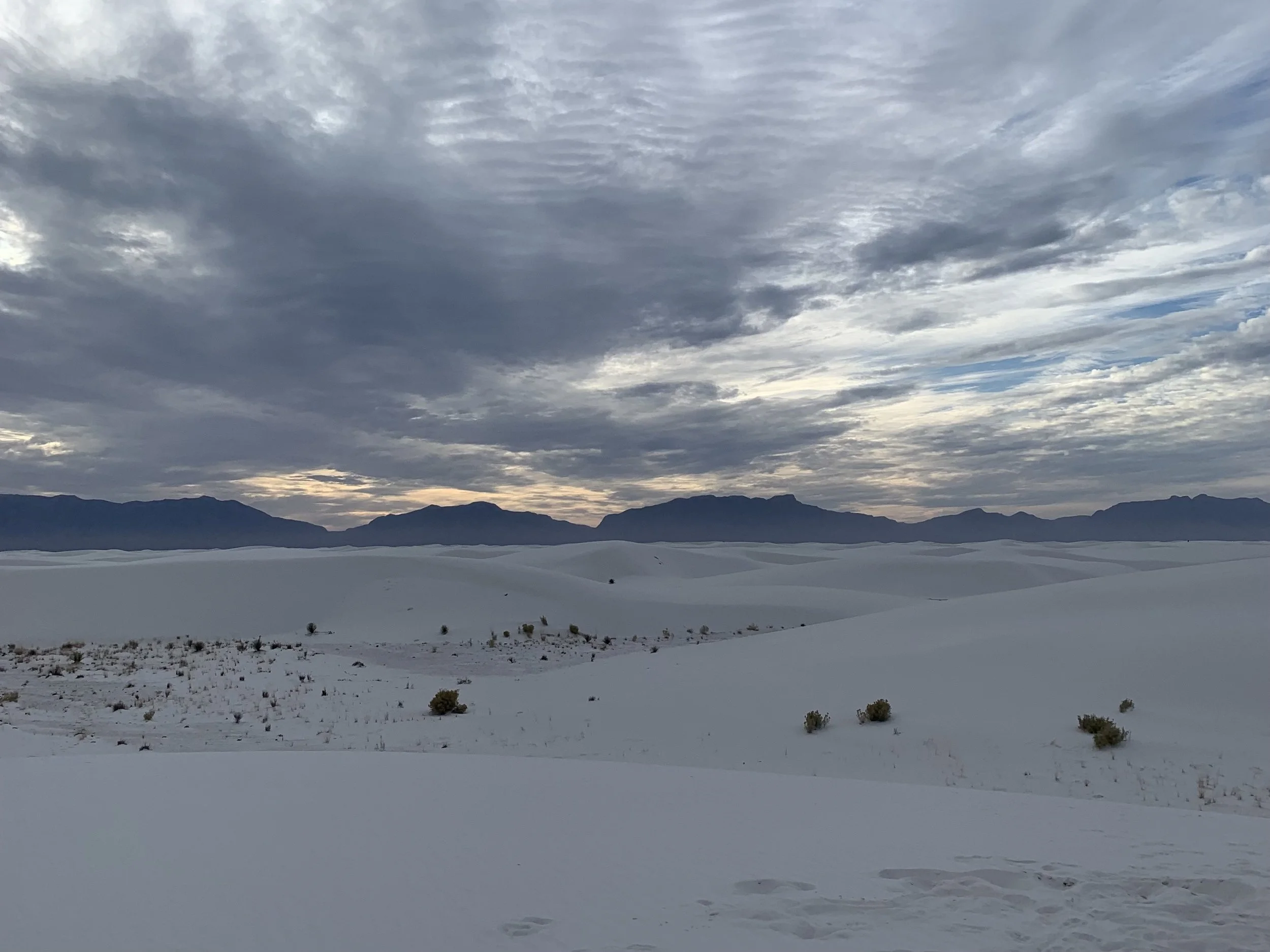


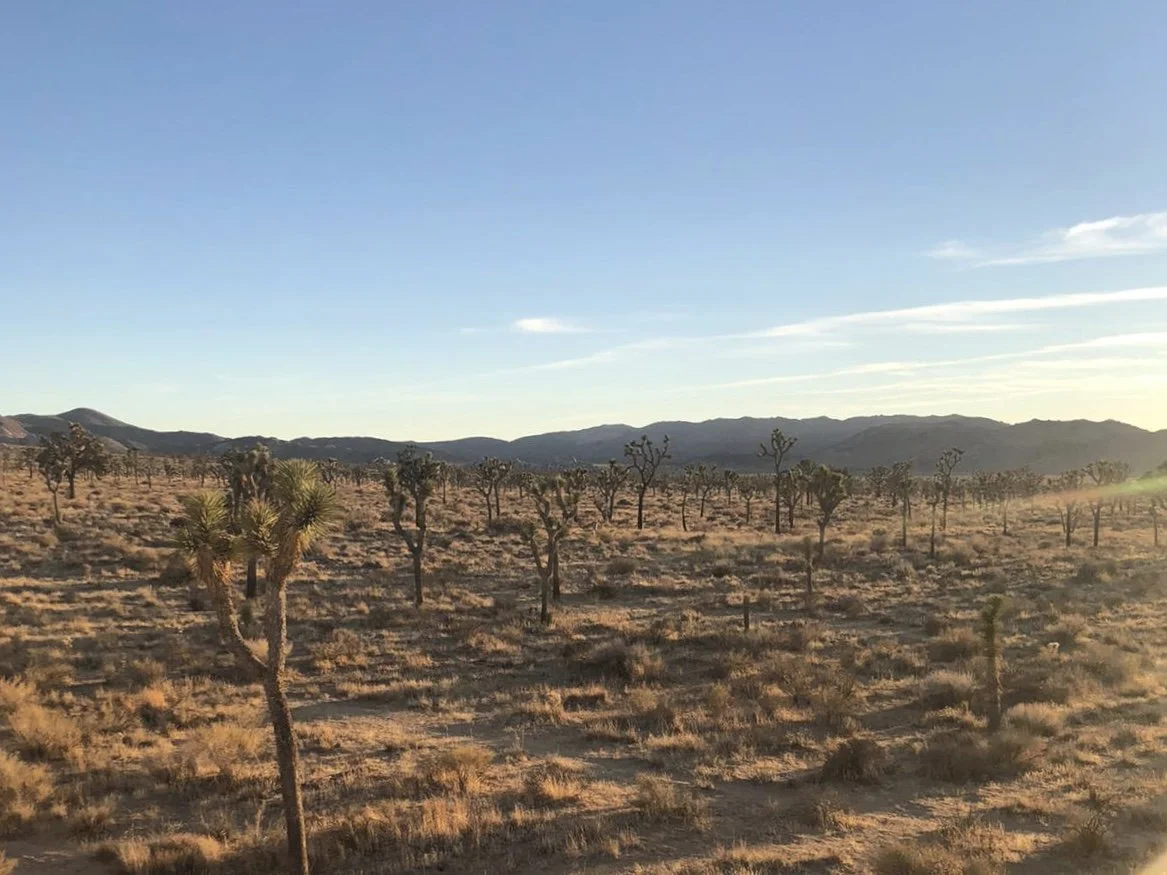
Real Talk
I’d be lying if I said vanlife is all beautiful vistas and crazy adventures. We thought that after we finished our three-month build it’d be smooth sailing, but we were wrong. The actual lifestyle required to live in a campervan is incredibly difficult and not for the faint of heart. Everything you do in a van takes twice as much work as it would in a house. Anything water-related (washing dishes, brushing teeth, drinking water, etc.) requires filling up, storing, and emptying. Charging items requires electricity which requires sunshine, storage, and monitoring. Sleeping requires researching, parking, and securing. Things like showering, washing, and cooking require a logistical headache. Most modern comforts are stripped away until you’re left with the bare essentials. We also struggled a bit with troubleshooting. Things go wrong regularly and we had to learn how to improvise. We drove to campsites that turned out to be nothing, we threw away important belongings thinking they were trash, and we got flat tires which we had to fix on the spot. Troubleshooting is a major part of the lifestyle and it’s not always comfortable.
However, there are plenty of upsides to vanlife. I have so many memories that years seem to have gone by, and since there’s a new adventure every day you’ll never feel stuck in place or bored. The amount of time we spend outdoors has probably tripled, too. While living in a vehicle, it’s so easy to get outside and explore. Overall, we went places and met people we never would have otherwise. I consider myself fortunate to have explored my home country in such a novel way. The United States offers diverse landscapes, philosophies, cultures, and they’re all within reach while living in a van. Given the previous pros and cons, only you can decide if vanlife is right for you.
Click below to continue to the blog!

